Maintaining a strong immune system is important all year round, but particularly as we head into autumn and winter. Supplements can help, and certain supplements work best in combination. Here Jane Collins outlines the most effective immune system perfect partners.
🕒 9 min read
How to help your immunity
As we head into cold and 'flu season the prospect of getting ill makes us increasingly aware of what we can do to maintain and support our immune system. Common-sense precautions like getting a 'flu shot and washing your hands regularly will help, as will general healthy living such as eating healthily, getting enough sleep, not smoking, cutting back on alcohol, managing stress and taking regular exercise.
Unfortunately, none of us has complete control over our immunity – genetics and age also make us more, or less, susceptible to infection and illness, and your immune system response can become less robust the older you get.
A steady flow of vitamins and minerals is needed to support the immune system; even with a healthy, balanced diet, it's not always possible to get enough; an example is vitamin D, which requires sunshine for your body to make the vitamin in the skin.
Supplements can help, and increasingly research suggests that many immune-supporting nutrients also work in synergy with others, increasing their efficiency.
Vitamin C and vitamin D3
These two vitamins are synonymous with maintaining healthy immunity. Vitamin C is a potent antioxidant known to increase production of white blood cells (leukocytes), which are key to fighting infections.
The body doesn't produce, or store, vitamin C, which is why you need regular amounts to contribute to normal immune function.
Vitamin D is a nutrient that is mainly produced on the skin when you are exposed to UVB sunlight, and we are all at risk of deficiency between October and March in the UK. For this reason, the National Institute for Health & Care Excellence (NICE) recommends we all take a 10µg supplement daily during this time.
During the winter our lower levels of vitamin D have been linked to higher risk of respiratory tract infections. Evidence published in The British Medical Journal suggests that more than three million fewer of us in the UK would come down with colds and 'flu if we were getting sufficient Vitamin D.
Vitamin D3 is the form of Vitamin D produced naturally in the body in response to sunlight, and when taken with Vitamin C can provide more robust support for your immunity. Getting adequate amounts of both these vitamins should safeguard you from deficiencies. If, however, you find tablets or capsules difficult to swallow, these vitamins are available in supplement form as chewable gummies, soluble effervescent tablets or in spray form. There are also Vitamin D supplements derived from algae that are suitable for vegetarians and vegans.
Find out more about how vitamins C and D work together to combat colds.
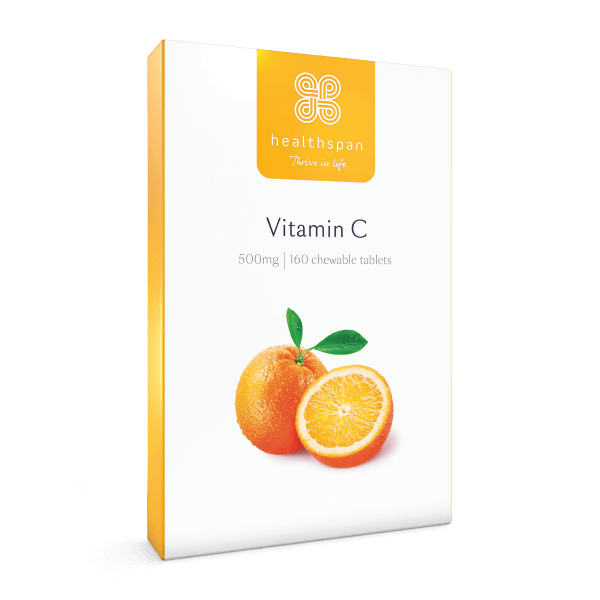
Vitamin C 500mg
Chewable tablets with 500mg vitamin C. Vegan-friendly
- Supports immunity, bones, joints and skin
- Added citrus bioflavonoids to combat free radicals
- Free from aspartame
Iron and vitamin C
Iron remains one of the most common micronutrient deficiencies worldwide, and yet this mineral is vital for the proliferation of immune cells. In fact, important immune cells called T-lymphocytes (or T cells) need large amounts of iron to help fight infections and destroy infected cells.
If your iron levels are low, your T cells can't do their job, and there is evidence to show that those low in iron often have frequent colds and/or are more susceptible to infections. Recent research also suggests that low levels of iron can inhibit immune responses to vaccines.
Supplementing with iron will help to reduce any deficiency, but taking it with antioxidant-rich and infection-fighting Vitamin C has been shown to maximise how much iron is absorbed, helping to increase how well it can support your immunity.
You can wash down your iron supplement with a Vitamin C-rich drink like orange or cranberry juice, choose an iron supplement with vitamin C already included, or make sure you include a vitamin C supplement as part of your supplement regime.
Find out more about T cells and other terms in the language of immunity.
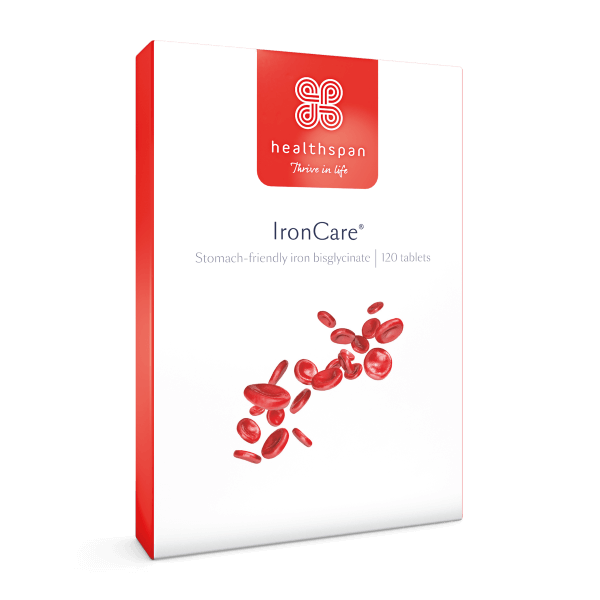
IronCare
Stomach-friendly, vegan iron tablets for healthy blood, energy and immunity
- 100% of the daily recommended amount of iron and copper, as well as vitamins B2, B6, B12 and C
- Supports red blood cell formation
- Combats tiredness and fatigue
Turmeric and black pepper
Turmeric is often lauded for its anti-inflammatory effect on joints, but it has also been shown to help support the immune system. Research suggests that turmeric's active ingredient, curcumin, can modulate the activity of T cells, B cells (which produce antibody molecules that can destroy invading viruses or bacteria) and natural killer cells that enhance the body's antibody response.
Turmeric has been found to reduce the severity of pneumonia and a range of viruses. In one small study a supplement of curcumin and piperine (a compound found in black pepper) was used to help treat COVID-19 patients, and this nutrient duo was found to have improved feelings of weakness following illness when compared to a placebo group.
Combining black pepper (or piperine) with curcumin has been shown to significantly boost absorption of curcumin.
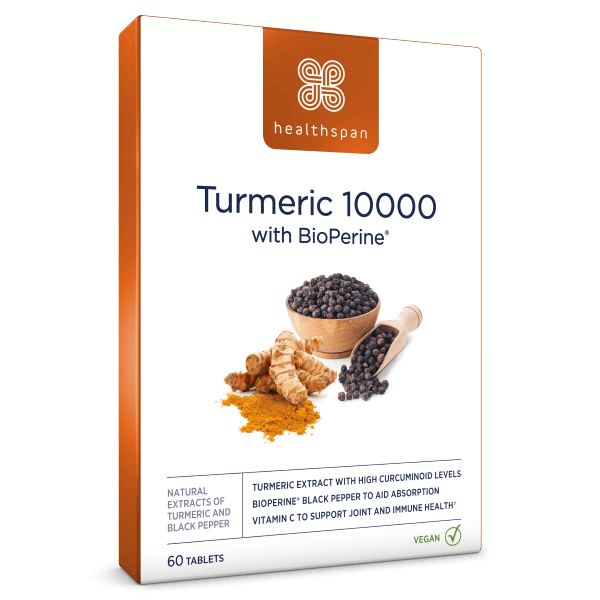
Turmeric 10000 with BioPerine®
With black pepper extract to help absorption
- 500mg high-strength turmeric extract (equivalent to 10000mg whole turmeric root)
- Added BioPerine® black pepper to aid turmeric absorption in body
- Added vitamin C to support joint, bone, and immune health
Zinc and vitamin B6
Zinc is well known as an immunity-enhancing mineral that helps support the function of the thymus gland, where our T cells mature. Those whose zinc levels are too low have little to no infection-fighting T cells. When those who are deficient in zinc are given the amount they need their thymuses grow and start releasing these all-important T cells.
According to research 16% of all respiratory infections worldwide have been found to be due to zinc deficiency. Evidence also shows that if zinc lozenges are used within 24 hours after cold symptoms start, they could help shorten the length of the cold.
Zinc works alongside Vitamin B6 to keep the thymus gland working optimally. Another of vitamin B6's roles is producing white blood cells and T cells, and together these two nutrients work in synergy to help support immunity.
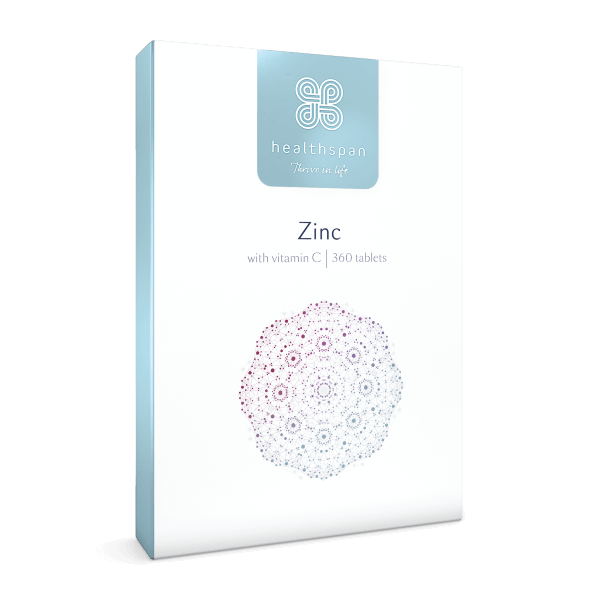
Zinc with Vitamin C
Easily absorbed zinc citrate for immunity, hair, nails, skin and vision
- Zinc citrate for easy absorption
- Supports immunity and multiple other health areas
- Support your health and wellbeing for 3p a day
Probiotics and vitamin D3
Research shows that up to 70% of the immune system is based in the gut, and this is why supplements of probiotic 'friendly' bacteria could be key in helping to fight off colds, 'flu and other illnesses.
One study involved volunteers who had come down with a cold four times or more in the past year. They were given a probiotic drink containing three strains of probiotic bacteria for 12 weeks, with the result that both their incidence of upper respiratory infection and 'flu-like symptoms afterwards were significantly reduced.
The authors of the study concluded that probiotic supplementation results in immune stimulation and was 'effective for fighting the common cold and influenza-like respiratory infections by boosting the immune system.' Taking your probiotic in combination with immune-protective Vitamin D3 should help to improve your immunity further.
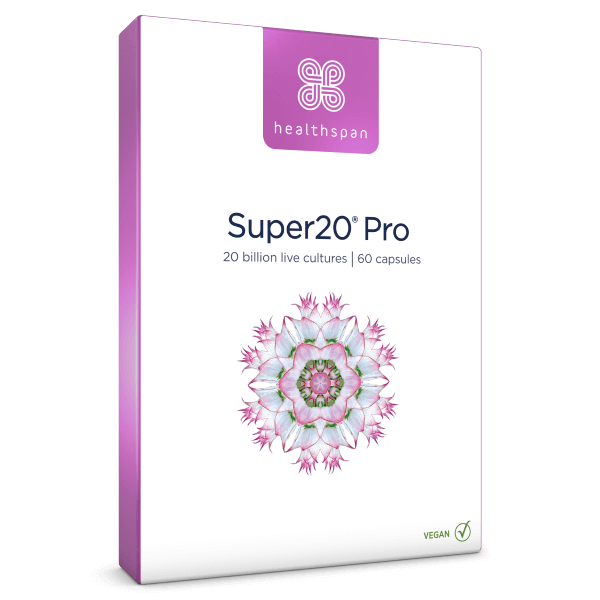
Super20 Pro
Best-selling probiotic
- 20 billion live cultures from 5 well-researched strains
- Contains Lactobacillus acidophilus, Lactobacillus paracasei, Bifidobacterium lactis and Bifidobacterium bifidum
- Supports the protective intestinal microflora in the gut
Vitamin C and vitamin B6
Vitamin C is perhaps the best-known immunity-supporting nutrient. Vitamin B6 (good food sources include oily fish, chicken, offal, wholegrains and leafy green vegetables) has been shown to help manufacture antibodies that can combat viruses and bacteria.
One study has shown how critically ill patients given a high-dose B6 supplement over two weeks had improved immunity at the end of the period. Vitamins C and B6 are also known to work well together to break down histamine; viral infections like colds and 'flu release histamine into the body, producing tell-tale symptoms such as sneezing, runny nose, itchy eyes and sore throat.
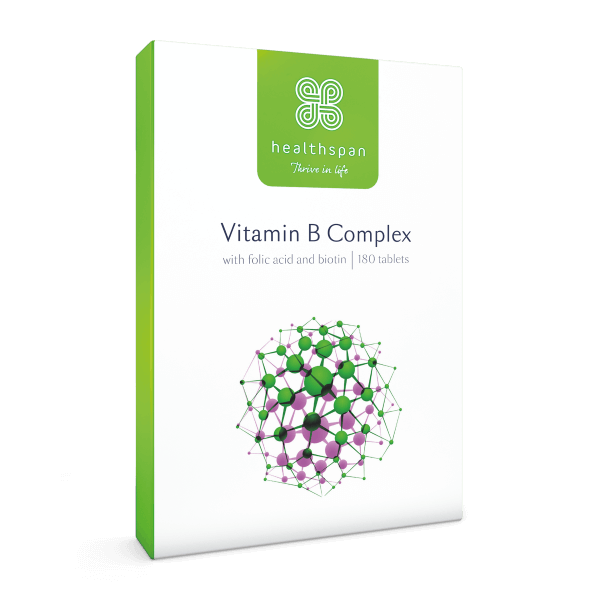
Vitamin B Complex
A vegan combination of all the essential B vitamins to support your brain, heart and energy levels
- 100% NRV of all eight B-complex vitamins
- Supports immunity and reduces tiredness and fatigue
- Heart, brain and nervous system support
Vitamin A and vitamin D3
Vitamin A is necessary for normal immune function, and is involved in the production and function of white blood cells. A deficiency has been shown to compromise your immunity by increasing susceptibility to infections, and slowing recovery if you do become ill.
Evidence has found that supplementing with Vitamin D protects against viral respiratory infections, even in the elderly. Research also suggests that vitamin A enhances the effects of vitamin D, and in combination these vitamins are potent potent immunomodulators (substances that help your immune system work more effectively) that can do a better job of maintaining a healthy immune response when taken together.
Warning: vitamin A supplements should not be taken if you are pregnant.
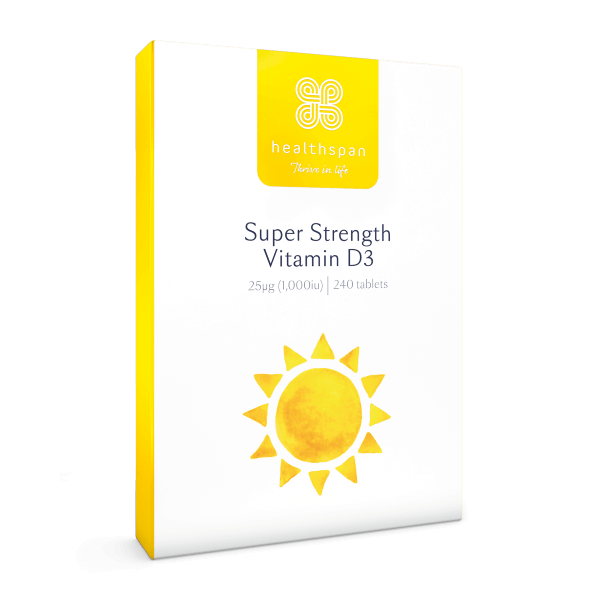
Super Strength Vitamin D3
For healthy bones, teeth, muscles and immunity
- 25µg vitamin D per tablet
- Helps keep bones, teeth and muscles healthy, and supports immunity
- Multiple health benefits from 5p a day
Elderberry and vitamin D
Elderberry has been used for centuries as a natural remedy for colds and 'flu. Studies have shown that these tiny antioxidant-packed, Vitamin C-rich berries can shorten the duration of 'flu by four days when compared to a placebo. It has been suggested that the polyphenols in elderberries can support immune defence by increasing white blood cell levels.
Research from the University of Sydney also suggests that elderberry may help block the flu virus from attaching to a cell and entering it – so stopping the virus from replicating.
Twinning this therapeutic berry with the infection-fighting properties of Vitamin D could help to reduce the severity of cold and flu symptoms and the length of time the illnesses hang around.
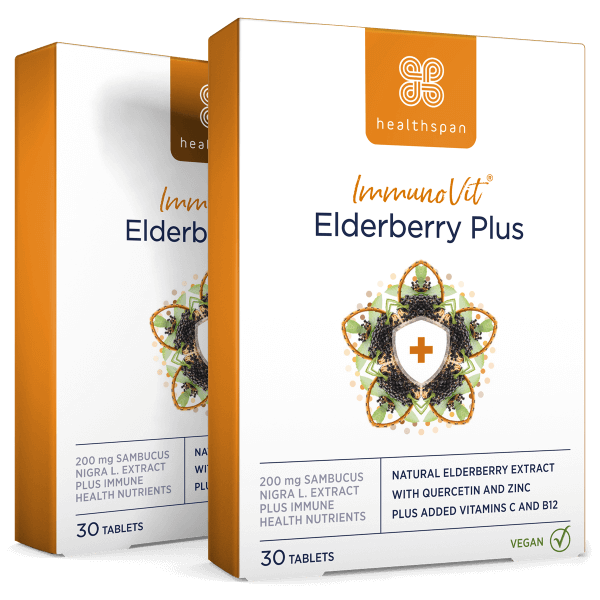
ImmunoVit® Elderberry Plus
200mg black elderberry extract
- Botanical immune health complex
- Supports your immune system
- Added vitamins B12 and C, plus zinc and quercetin
Mushroom extracts and vitamin C
Medicinal mushrooms including reishi, maitake and shitake are rich in antioxidants, polyphenols, beta glucans and other compounds that support and regulate immune health.
Beta glucans, for example, are known to enhance natural killer cell function, helping to stimulate the immune response when these cells come into contact with invading pathogens like viruses and bacteria. They may also help with the production of T cells and other immune cells.
A study from 2020 found that shitake mushrooms could help with asthma and lung infections, and evidence suggests that they could be used alongside conventional medicines in treating symptoms of COVID-19.
There is some evidence to suggest that mushroom extracts are better absorbed and have increased bioavailability when taken in combination with Vitamin C, although this has yet to be confirmed in any human studies.
We do know, however, that Vitamin C can guard cells from oxidative damage, and adequate levels can have immune-protective effects.
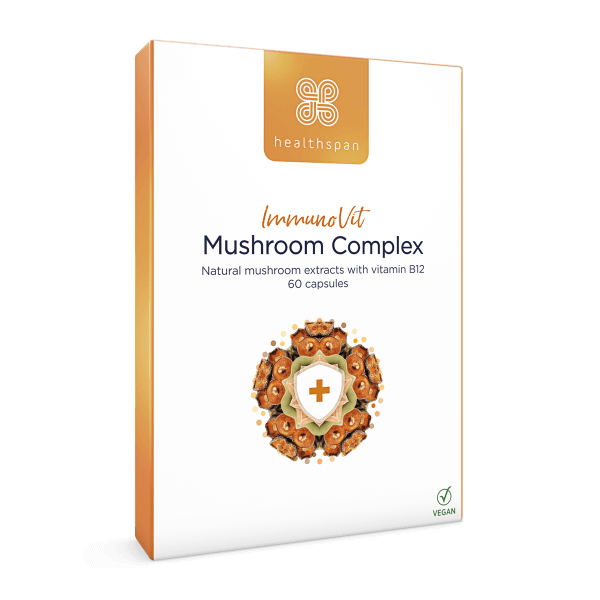
ImmunoVit® Mushroom Complex
300g reishi, maitake and shiitake mushroom extracts
- Supports your immune system
- Natural mushroom blend
- Contains 200% NRV vitamin B12 to aid energy levels
Echinacea and vitamin C
Echinacea has been used for centuries as a traditional herbal remedy for the relief of colds and 'flu. A review of 14 clinical trials found that taking it could cut the odds of developing a cold by 58% and lower the duration of a cold by between one and four days.
Some studies have used echinacea with other supplements like Vitamin C, and a study involving children given a combination of echinacea, propolis (a resin-like substance made by bees) and vitamin C for 12 weeks showed that echinacea had a preventative effect on the incidence of respiratory tract infections.
Taking echinacea with a Vitamin C supplement at the first sign you are coming down with a cold or 'flu could potentially ward it off or reduce the severity of symptoms.
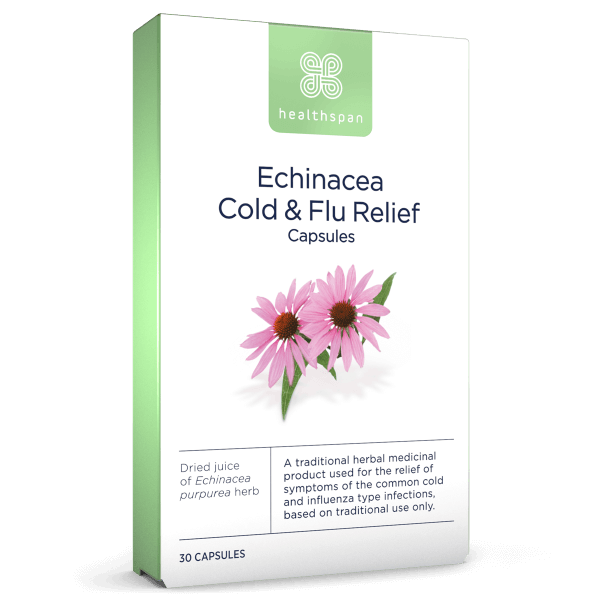
Echinacea Cold & Flu Relief
Provides symptoms relief for the common cold and influenza-type infections
- Registered Traditional Herbal Medicine (THR)
- Traditionally used to relieve cold and flu symptoms
- To be taken at the first sign of a cold
Quercetin and green tea
Quercetin is an antioxidant that hit the headlines during the COVID-19 pandemic when supplementation was found to reduce the severity and duration of respiratory symptoms.
Found naturally in foods like apples, red onions, cranberries, cherries, capers and cocoa, quercetin has been found to protect against viruses including 'flu and rhinovirus (the common cold).
Quercetin appears to work well with other immune-supporting nutrients including vitamins C and D, the mineral zinc, and green tea. Green tea has long been associated with immune strengthening, and is known to contain a powerful antioxidant called Epigallocatechin (EGCG): in one test tube study EGCG was shown to help stop the flu virus replicating.
In another study from 2020 healthcare workers given a drink containing catechins (the main polyphenols in green tea) daily for three months reduced their risk of respiratory tract infections by half when compared to a control group.
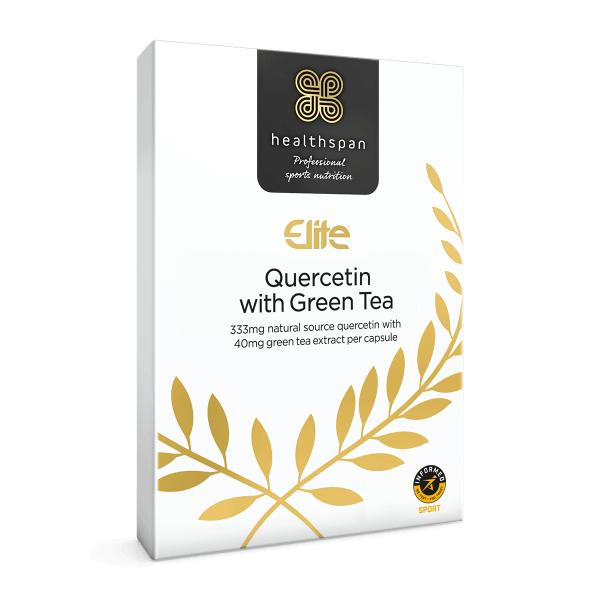
Quercetin With Green Tea
Quercetin with green tea extract for enhanced absorption
- 1,000mg natural source quercetin
- 120mg added green tea for enhanced absorption
- Suitable for vegetarians and vegans







